Whitney Wolfe Herd Has Big Plans for Bumble in 2019
Bumble's empire of female empowerment is branching out beyond the world of dating apps. Up next? A skincare line—and an ambitious campaign to end misogyny.
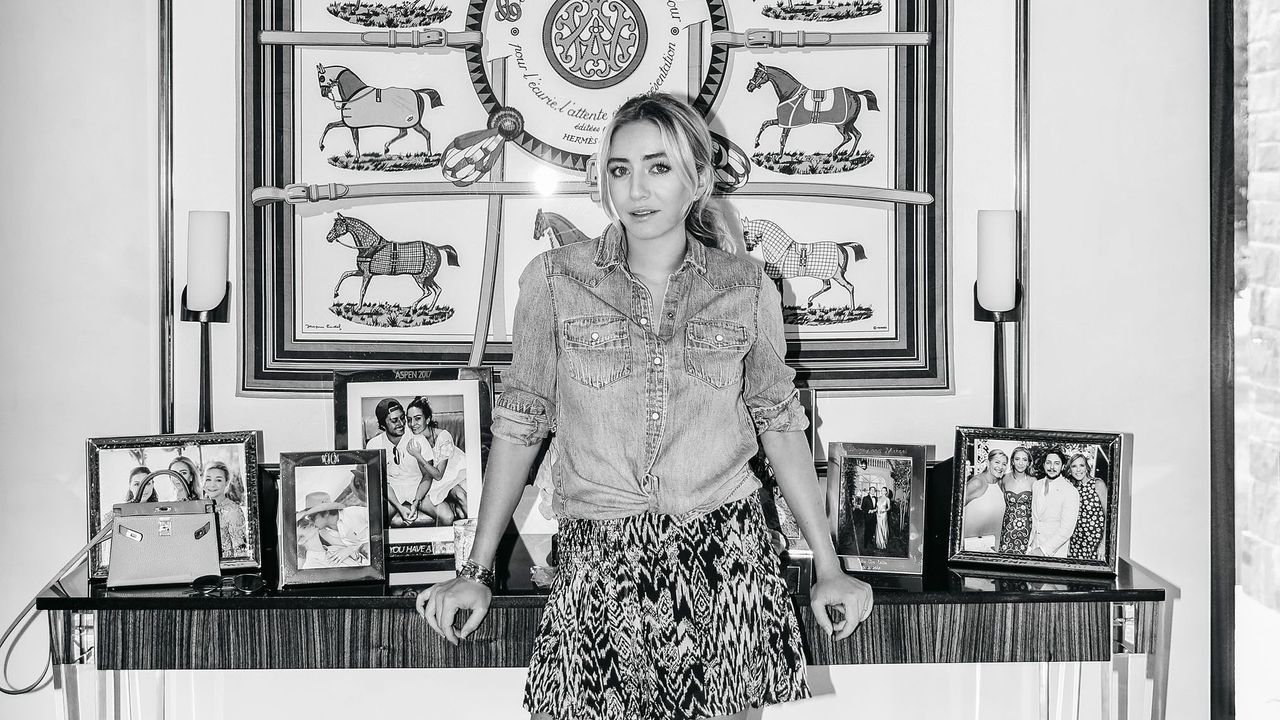
At the end of every work week, Bumble CEO Whitney Wolfe Herd likes to slow things down for her team. Often this means staying at HQ—a playful mid-century-style pad of many yellows and hexagonal motifs—to treat the now-60-person team based in Austin, Texas, to manicures in the designated Glam Room (which doubles as a nursing haven for new moms). But today she takes them to the local Alamo Drafthouse Cinema to see RBG, the recently released documentary about iconic Supreme Court Justice Ruth Bader Ginsburg. The group of staffers, mostly women, fills seats around Wolfe Herd; the theater, with its menu of food and cocktails, provides a giddy sense of playing hooky rather than one of required reading. Betty Boop for President, a slyly subversive black-and-white cartoon, plays before the documentary. The two films are an appropriate combo fort his gang: Bumble is nothing if not woman-centric, and its notions of womanhood intertwine strands of the cute with the noble, the ambitious with the decorous, and the feminine with the feminist.
A plate of chicken tenders on her lap, Wolfe Herd visibly relaxes when the lights go down. Watching the film, she seems to give herself over to not being Whitney Wolfe Herd, tech-startup mogul. For the first time all day, she’s just a 29-year-old at the movies.
Teetering between these two worlds has its price. Earlier in the day, soon after we meet, Wolfe Herd breezily says she feels dizzy. “Does that ever happen to you? I think it’s anxiety. I have so much. Yesterday, I cried for 2 minutes in my kitchen. Why is that?” Wolfe Herd says she used to try to hide her anxiety, but “if people look at me and think I’ve got it all together, why not tell the truth?”
One could forgive Wolfe Herd for feeling a little anxious. She’s running a relationships platform with over 35 million users globally that is already in the U.S., Europe, Canada, Australia, Mexico, and Latin America and is launching in India this fall. Bumble BFF, a feature to connect with new friends, recently crossed three million users, and Kris Jenner announced in April she was using Bumble Bizz, the app’s professional networking service, to hire an assistant. Bumble is countersuing Match Group, which owns Tinder, for $400 million. (The legal back-and-forth started last February, after Match reportedly said it was interested in acquiring Bumble, which opened its books. When Bumble turned down Match’s acquisition offer, Match sued for alleged intellectual-property infringement.) Wolfe Herd joined Imagine Entertainment’s board of directors in July, and in August, Bumble launched Bumble Fund, a venture-capital arm that invests in women-led businesses. When I meet with Wolfe Herd in June, she is also nursing her husband, Michael Herd, an executive at an oil company who recently had follow-up back surgery after surviving a near-fatal car accident in 2017, and overseeing the second-floor renovation of their house. Oh, and Bumble is getting into the beauty game.
“I have so much anxiety. Yesterday, I cried for 2 minutes in my kitchen. Why is that?”
Yes, you read that correctly. Bumble has spent several months working with psychotherapists and dermatologists to make serums that simultaneously solve skin and, according to the company, emotional issues. In mid- to late-2019, Bumble will launch two serums with quirky names, like Break Up With Bad, the line’s facial oil for “breakups and breakouts.” And that’s just the beginning.
Empowering women is Wolfe Herd’s cornerstone, the motivator that fuels all of her ambitious plans. She says her personal goal is to eradicate misogyny—to make it illegal. When I ask if she thinks it’s truly possible to put an end to a phenomenon that has been around since time immemorial, she looks at me squarely, pauses, and says, “We can try.” It’s why she’s working with legislators to get a bill passed that would make sending unsolicited pictures of genitalia an offense similar to flashing in public. (The conversations are so preliminary that it’s too early to name specific legislators, says Bumble.) If a man who’s been rebuffed by a romantic interest hostilely sends an “eggplant pic,” Bumble’s coy reference to a “dick pic,” Wolfe Herd wants him to be held accountable. She points to a nearby stop sign. “If you run it, you get arrested. Laws attach consequence.”
So much of Wolfe Herd’s impetus to cast a wide net and make as much impact as possible stems from her life experiences. “They say that the greatest companies in the world come out of someone’s personal heartbreak,” she says. Wolfe Herd famously sued Tinder, which she cofounded, for sexual harassment after being fired in 2014. Though she’s legally barred from discussing the suit, which the two parties reportedly settled for $1 million, she does say that four years ago, “it wasn’t #MeToo; it was #MeOnly.” Years before, in her first romance as a teenager in Salt Lake City, she dated someone who “told me what clothes to wear, certain friends to stay away from, how everyone was prettier than me, and then he would disappear for days. Talk to any FBI agent. They’ll tell you the easiest way to torture someone is the silent treatment. It is severe physical and mental torture,” she says. “My mom had to literally intervene. She went to his house and said, ‘Stay away from my daughter.’”
Stay In The Know
Get exclusive access to fashion and beauty trends, hot-off-the-press celebrity news, and more.

'Wolfe Herd, at her home in Austin, TX, is spearheading Bumble Beauty, a new line of serums.'
Despite her desire to squash the gender-fueled behavior she dealt with as she came of age, Wolfe Herd still straddles the line between the classic and ultramodern paradigms of being a woman. “Sometimes she wants to be the traditional wife. She’ll work a 12-hour day and come home. I’ll say, ‘Let’s order in,’ and she’ll want to cook dinner instead,” says her husband. Wolfe Herd has cultivated a public persona that screams lovely; think Audrey Hepburn—if Hepburn used terms like “intersectional feminism.” But Herd adds, “No Harvard Business School tells you how to do what Whitney’s done. She stood up against a multibillion-dollar corporation that had every ability to swallow her up. You don’t leave Exxon and start Chevron. She did. It’s unbelievable: Her ambition, strength, and ability to persevere have created so much success.”
Yet Wolfe Herd often tempers that success with a kind of prettiness and accessibility that seem to prove she doesn’t feel times have changed enough—something she discusses regularly with her good friend Ty Haney, the founder and CEO of Austin-based Outdoor Voices sportswear. “Men are expected to be ruthless. They’re allowed to cut people down. I feel like I have this expectation to bend, to fold, to be nice to everyone, and if I’m not I’m labeled a B-I-T-C-H,” says Wolfe Herd. Haney says the performance expectations for men and women are the same, but “there are more eyeballs on our trajectories. More criticism.” It’s why the two spend early mornings paddleboarding on Lake Austin, just off of Wolfe Herd’s lawn, or playing tennis on her court. “There aren’t many female founder-CEOs. It’s quite lonely,” says Haney. Having Wolfe Herd as a peer, a friend, has been helpful personally and professionally. “My motto is ‘totally possible.’ With Whitney, it’s ‘beyond totally possible.’ She’s like a queen bee. Her energy attracts people. She’s my brain trust,” says Haney. “Whitney is so good at taking care of people. She’s a boss-mama.”
“No Harvard Business School tells you how to do what Whitney’s done.” —Michael Herd, husband
A woman pushing boundaries, even if she’s doing so under the cover of beauty and charm, can easily anger a faction of men in this country. In April, two months after the Parkland shootings, Bumble banned guns from profile pictures, and Wolfe Herd received an angry email from one man who threatened “to put his Glock and his you-know-what in my mouth,” sending a picture of each. Another critic reportedly published false rumors about her, accompanied by her picture and her cell number, on neo-Nazi site the Daily Stormer in 2017; the company received hundreds of messages from men detailing how they wanted to mutilate the female employees and writing that women existed only for their pleasure. The Austin police camped out at Bumble’s offices for a week, and the FBI got involved. Today, a source close to Wolfe Herd says her house in a gated community has multiple security systems, Bumble’s new HQ has full-time security, and Wolfe Herd travels with a bodyguard.
All the pushback, the lawsuits, and the ugly threats do is motivate her. Just before Wolfe Herd takes her staff to see RBG, there is an all-hands meeting at HQ. Everyone gathers in an open central space on long yellow velvet couches. Wolfe Herd sits just apart and is being videoed for satellite offices—about 30 employees work outside of Texas, in cities like New York, Paris, Mexico City, London, and Sydney—to watch her answer anonymous questions submitted by employees. The last one: What is the future of Bumble?
To grow. “I fucking love this,” Wolfe Herd says of the challenge. “I want to take this sucker around the planet. Then, who knows, maybe we’ll work with Bezos and Musk and take it beyond.”
This article originally appeared in the October 2018 issue of Marie Claire.
RELATED STORY

-
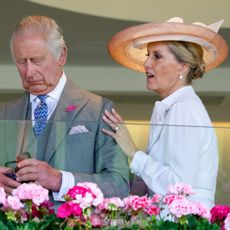 Why Duchess Sophie Allegedly Feels "Snubbed" by King Charles
Why Duchess Sophie Allegedly Feels "Snubbed" by King Charles"There should be an opportunity for Sophie to be allowed to do more," a royal expert claimed.
By Amy Mackelden Published
-
 Dua Lipa Swaps Her Valentino Dress for a Marni Mini Skirt
Dua Lipa Swaps Her Valentino Dress for a Marni Mini SkirtThe singer accessorized her outfits with more than $120,000 of jewelry.
By Amy Mackelden Published
-
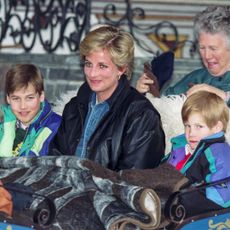 Harry Was Allegedly Crushed When William Received "Special Treatment"
Harry Was Allegedly Crushed When William Received "Special Treatment""Poor Harry's face across the table," Princess Diana's former butler recalled.
By Amy Mackelden Published
-
 Peloton’s Selena Samuela on Turning Tragedy Into Strength
Peloton’s Selena Samuela on Turning Tragedy Into StrengthBefore becoming a powerhouse cycling instructor, Selena Samuela was an immigrant trying to adjust to new environments and new versions of herself.
By Emily Tisch Sussman Published
-
 This Mutual Fund Firm Is Helping to Create a More Sustainable Future
This Mutual Fund Firm Is Helping to Create a More Sustainable FutureAmy Domini and her firm, Domini Impact Investments LLC, are inspiring a greater and greener world—one investor at a time.
By Sponsored Published
-
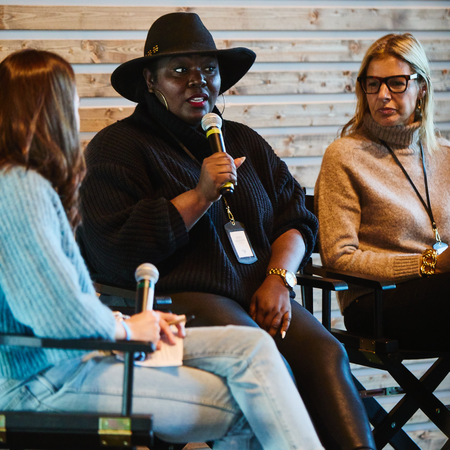 Power Players Build on Success
Power Players Build on Success"The New Normal" left some brands stronger than ever. We asked then what lies ahead.
By Maria Ricapito Published
-
 Don't Stress! You Can Get in Good Shape Money-wise
Don't Stress! You Can Get in Good Shape Money-wiseFeatures Yes, maybe you eat paleo and have mastered crow pose, but do you practice financial wellness?
By Sallie Krawcheck Published
-
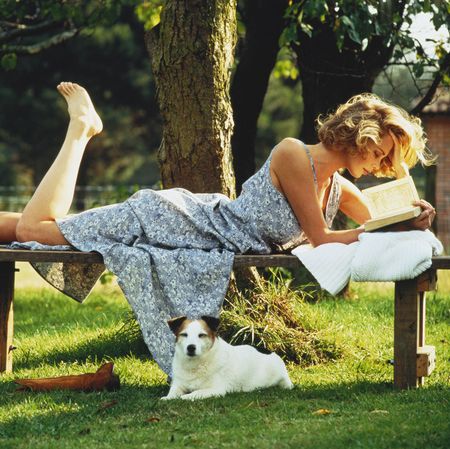 The Book Club Revolution
The Book Club RevolutionLots of women are voracious readers. Other women are capitalizing on that.
By Lily Herman Published
-
 The Future of Women and Work
The Future of Women and WorkThe pandemic has completely upended how we do our jobs. This is Marie Claire's guide to navigating your career in a COVID-19 world.
By Megan DiTrolio Published
-
 Black-Owned Coworking Spaces Are Providing a Safe Haven for POC
Black-Owned Coworking Spaces Are Providing a Safe Haven for POCFor people of color, many of whom prefer to WFH, inclusive coworking spaces don't just offer a place to work—they cultivate community.
By Megan DiTrolio Published
-
 Where Did All My Work Friends Go?
Where Did All My Work Friends Go?The pandemic has forced our work friendships to evolve. Will they ever be the same?
By Rachel Epstein Published